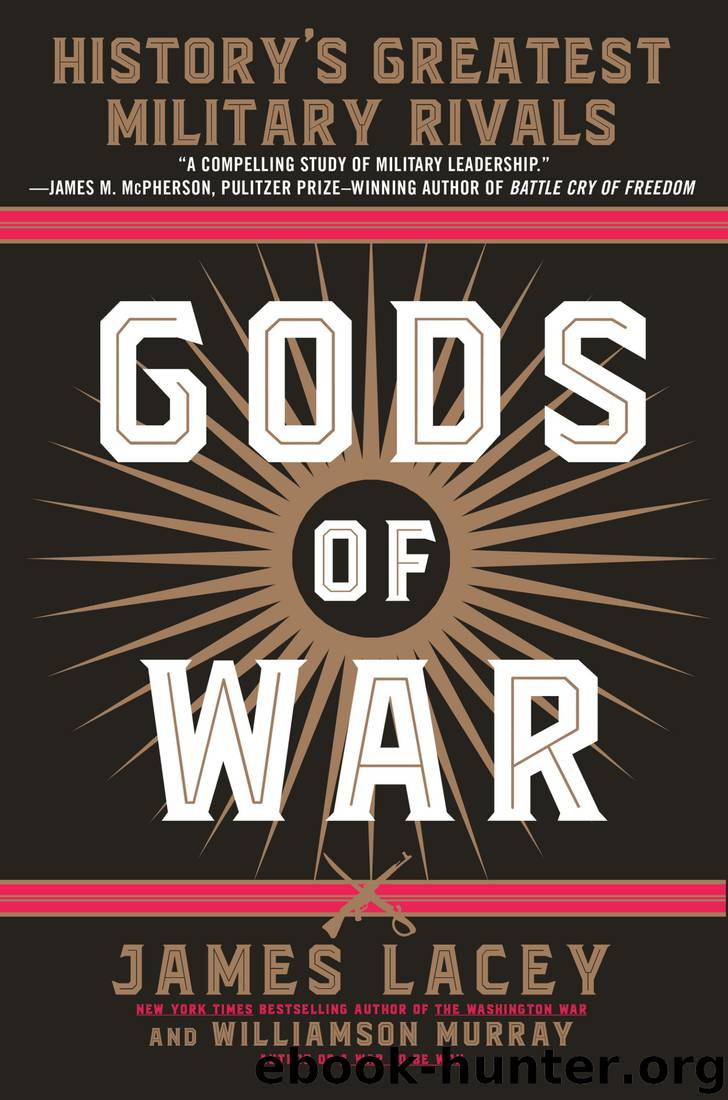Gods of War: History's Greatest Military Rivals by James Lacey

Author:James Lacey [Lacey, James]
Language: eng
Format: epub
ISBN: 9780345547552
Amazon: 0345547551
Publisher: Bantam
Published: 2020-05-18T23:00:00+00:00
Wellesley sailed on July 12, 1808, and landed in La Coruña, where he began planning active operations. He was not there long when Castlereagh informed him that substantial reinforcements were on the way and that, as the Duke of York considered him too junior for such an important command, first Sir John Moore and then Sir Hew Dalrymple would supersede him when they joined the army. In a stroke Wellesley went from an independent command to third in the pecking order. He assured Castlereagh that he would serve whoever replaced him and would do nothing in the meantime to precipitate any personal quest for glory. In a more candid letter to the Duke of Richmond he wrote: “I hope that I will have beat [General Jean-Andoche] Junot before any of them can arrive and then they can do what they want with me.”
Almost immediately he marched south and met a small French force at Roliça. After a hard fight the French withdrew unmolested. Wellesley received a welcome four thousand reinforcements the next day, but that was a mixed blessing, as Lieutenant General Harry Burrard was on board one of the ships and outranked him. After hearing Wellesley’s plan for a further advance, he advised caution and told Wellesley to await reinforcements arriving with Moore. That may have been the plan, but the French also had a vote, for at that moment Junot was already approaching the British camp at Vimeiro with fourteen thousand men. To say that Junot fought a poor battle is an understatement. Wellesley, on the other hand, fought an almost textbook battle that would become his hallmark on other fields in Portugal and Spain. Typical of a French assault, swarms of skirmishers, whose job was to make life miserable for the standing lines of enemy regiments, preceded the main attack. The idea was that they would shake the morale of the enemy regiments, which would then be easy prey for the massed columns of French infantry. Wellesley, however, countered this by sending out his own skirmishers, while keeping the bulk of his infantry on the reverse slopes of hills, protected from enemy fire. The rifle-armed British skirmishers, supported by artillery, made quick work of the French skirmishers, who broke to the rear. The thin British line then advanced, just as the French columns marched.
The “thin red line” of a battalion was only two deep, allowing all four to five hundred muskets to fire. As the British spent more training time on marksmanship than any other army, each volley was devastating. They had also perfected a platoon fire scheme that maintained a continuous fire on the enemy. As the French columns approached, they could hear the shouts of a British officer at the center of the line: “By platoons…FIRE!” On the far right a platoon would fire its deadly projectiles and a fraction of a second later the second platoon would fire. And so it went in succession as the command to fire and the deadly blasts rippled down the line.
Download
This site does not store any files on its server. We only index and link to content provided by other sites. Please contact the content providers to delete copyright contents if any and email us, we'll remove relevant links or contents immediately.
| Afghan & Iraq Wars | American Civil War |
| American Revolution | Vietnam War |
| World War I | World War II |
Waking Up in Heaven: A True Story of Brokenness, Heaven, and Life Again by McVea Crystal & Tresniowski Alex(37033)
Empire of the Sikhs by Patwant Singh(22204)
We're Going to Need More Wine by Gabrielle Union(18105)
Hans Sturm: A Soldier's Odyssey on the Eastern Front by Gordon Williamson(16993)
Leonardo da Vinci by Walter Isaacson(11947)
The Radium Girls by Kate Moore(10940)
Educated by Tara Westover(7094)
Tools of Titans by Timothy Ferriss(6996)
How to Be a Bawse: A Guide to Conquering Life by Lilly Singh(6721)
The Last Black Unicorn by Tiffany Haddish(5091)
Permanent Record by Edward Snowden(5027)
The Rise and Fall of Senator Joe McCarthy by James Cross Giblin(4858)
Promise Me, Dad by Joe Biden(4473)
The Wind in My Hair by Masih Alinejad(4437)
The Crown by Robert Lacey(4126)
A Higher Loyalty: Truth, Lies, and Leadership by James Comey(4052)
The Iron Duke by The Iron Duke(3663)
Joan of Arc by Mary Gordon(3281)
How to be Champion: My Autobiography by Sarah Millican(3202)
